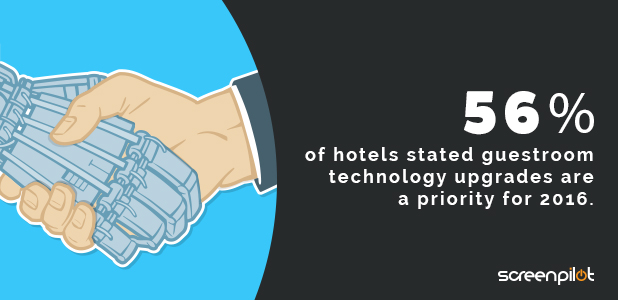
Last year, the Henna-na Hotel in Japan opened with a roar. Literally.A 144-room, low-cost hotel coming online typically wouldn’t have garnered such buzz, but then again the Henna-na is the world’s first hotel staffed almost entirely by robots.From the reception desk – which features a multi-lingual, bowtie-donning dinosaur – to the porter service, to the in-room concierge, robots run the show.While not every hotel can (or should) feature an animatronic dino at its front desk, the unique project serves as the one of the latest, if over-the-top, examples of the growing integration of technology and hospitality.Humor (and velociraptors) aside, it’s clear that “tech” is the biggest evolutionary development to hit the hotel industry since the single-serve coffee maker. The explosion of the Internet of Things, that ever-expanding ecosystem of internet-connected devices that allows us to consume and share information, has redefined almost every industry. Hospitality is no exception.A recent article in Hospitality Technology (HT) outlined some of the latest technology trends and how they’re changing various aspects of the guest experience.
Marketing Trends
The use of mobile data, especially location data, is already changing the way hotels interact with guests.The Fountainbleu Miami Beach is currently leveraging GPS data to upsell guests with pre-arrival or late-check out offers. In fact, the hotel tracked a 141% return on investment from late-check out offers alone in the first month after introducing the program.Mobile data, when used strategically, generates increased customer “touches” that can be tailored to a guest’s individual tastes and purchase patterns. Returning guests who previously patronized the hotel spa might receive a discount on treatment.Granular information, such as a splashes about the daily lunch specials at the hotel restaurant or push notifications about local events, not only promote customer engagement and loyalty, but hold the potential to drive revenue.
Guestroom Tech Trends
Speaking of dinosaurs, the extinction of in-room movie services in most hotel rooms attests to the evolving viewing habits of the modern traveler.

According to HT, 56% of hotels will be making guestroom technology upgrades a priority in 2016. Increasing the bandwidth and security of in-house Wi-Fi takes first priority in tech upgrades, followed by better televisions and/or multi-use HD monitors that connect easily with guest’s mobile technology.Keyless entry using smartphones has the potential to save money for hotels and, increasingly, this technology is becoming mainstream. Some hotels, including the Henna-na, have even implemented facial recognition technology for openings doors.
Environmental Management / Energy Savings Trends
With energy being one of the largest line items in hotel’s operating budget, any savings in this sector can make an notable impact on the bottom line.The Hilton Worldwide brand employed a proprietary platform called LightStay to gather data on how individual properties manage energy with the goal of identifying potential opportunities for conservation. Like those signs that gently suggest guests should reuse towels for the good of the environment, look for technological advances that encourage, and perhaps even incentivize, guests to participate in the “greening” of hotel operations.These tech trends make sense from a hotel operations perspective, but how does hotel technology – or a lack thereof – influence a traveler’s decision on where to stay?Data from a recent report on Guest Preferences for Technology Use in Hotels conducted by SoftwareAdvice.com presented some pretty compelling statistics.
- Given the choice, 60% of respondents in a sample of 3,103 random U.S. travelers, would prefer to stay in a hotel that would allow them to check in and out, as well as open their guestroom, with their smartphone.
- When asked about lobby technology, 37% of those surveyed would prefer to stay at hotels with check-in kiosks and lobby touchscreens and 41% would choose a hotel that offered facial recognition software that allowed for the personalization of service.
- When asked what major objective of tech innovation should be, 40% of travelers responded “cost savings.” The owners of the Henna-na Hotel, for example, say the robotic staff allows them to save about 70% on labor costs, which in turn allows them to keep room rates starting at less than one hundred dollars a night.
One of the clearest expectation trends from travelers is availability of reliable Wi-Fi at their hotel – in guestrooms, the common areas, the meeting spaces – and most don’t feel they should have to pay extra for access.According to a survey of 500 international travelers conducted by the computer networking company Brocade, 86% expect free Wi-Fi at their hotels.This telling statistic provides perhaps the biggest take-home message for hotels considering a tech upgrade; the properties that prove most successful in communicating the benefits of their new technology to their guests, via improved service and experience, and demonstrate a willingness to pass along cost savings, will benefit the most from the adopted innovation.






